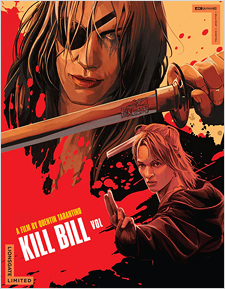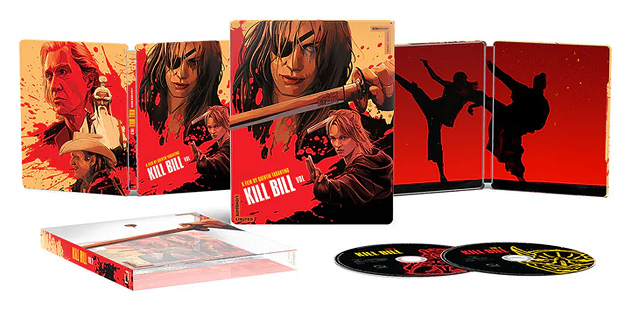Kill Bill: Volume 2 – Lionsgate Limited (Steelbook) (4K UHD Review)

Director
Quentin TarantinoRelease Date(s)
2004 (January 21, 2025)Studio(s)
A Band Apart/Miramax Films (Lionsgate Limited/Lionsgate Home Entertainment)- Film/Program Grade: B
- Video Grade: A-
- Audio Grade: A
- Extras Grade: D+
Review
Now that the Bride (Uma Thurman) has vanquished two members of the “Deadly Viper” assassination squad, we finally learn in flashback what happened to her at the wedding chapel in Texas. And we learn how she was trained to be a warrior and to persevere in the face of the greatest adversity by the legendary martial arts master Pai Mei (Gordon Liu), training that later serves her well when Budd (Michael Madsen) manages to bury her alive. But the Bride will not be denied her chance for revenge against Budd, and ultimately his brother Bill (David Carradine) as well. First though, she means to have a little girl-to-girl talk with another Viper who owes her a pound of flesh… the deadly and one-eyed femme fatale Elle Driver (Daryl Hannah). And when the Bride finally does stand face to face with Bill for their final showdown, she learns that he’s got one last surprise in store for her.
Directed by Quentin Tarantino, Kill Bill: Volume 2 is (again) a film that you either like or you don’t. The thing is, you can’t really evaluate this film independently of its prequel, Kill Bill: Volume 1 (reviewed here in 4K). So it’s best to think of them as two halves of a larger cinematic whole. And while its less convoluted than Volume 1, it still features scenes that jump forward or backward in time, some exposition and others lengthy and elaborate action sequences. What’s more, almost everything that happens here is highly theatrical and/or a reference to films and cinematic genres that Tarantino has come to love over the course of his life, including (but in no way limited to) Toshiya Fujita’s Lady Snowblood (1973), Akira Kurosawa’s Yojimbo (1961), the Zatoichi films, Shaw Brothers actioners like Five Deadly Venoms (1978), The 36th Chamber of Shaolin (1978), and the wuxia classic The One-Armed Swordsman (1967), Francois Truffaut’s The Bride Wore Black (1968), Takashi Miike’s Ichi the Killer (2001), Seijun Suzuki’s Tokyo Drifter (1966) and Branded to Kill (1967), Osamu Dezaki’s anime Golgo 13 (1983), the 1980 Japanese TV series Shadow Warriors, Sergio Corbucci’s Navajo Jo (1966), the 1966-67 ABC TV series The Green Hornet, and 1970s exploitation films a-plenty. And all that’s just for starters. So if you love these things as well, you’ll probably love Kill Bill. But if you don’t, you’re likely to find it a slog.
Kill Bill: Volume 2 was shot on 35mm film (in Super 35 format) by cinematographer Robert Richardson (JFK, Once Upon a Time in Hollywood) using Arriflex 435 and Panavision Panaflex Millennium and Platinum cameras with Panavision Primo lenses, and it was finished as a 2K Digital Intermediate at the 2.40:1 scope aspect ratio for theaters. For its debut on Ultra HD, Lionsgate has upsampled this 2K source—per Tarantino’s choice—and remastered the film digitally, with grading for high dynamic range (both HDR10 and Dolby Vision are available). It’s further been encoded for a BD-100 disc to ensure the highest possible video data rates (which frequent the 70-80 Mbps range).
The 4K image quality is excellent on the whole, thanks to the high data rate, the new remastering, and the HDR grading. Because it’s an upsample of the original 2K DI though, it’s not quite as impressive as Jackie Brown in 4K (reviewed here, for which the original camera negative was rescanned). But again, this was the filmmaker’s choice. Detail is very good, if somewhat less refined, and the image has a slightly processed appearance here due to its original post production pipeline. But photochemical grain remains in evidence at all times, texturing is solid, and the color palette is stunning—greatly enhanced by the wider gamut. Shadows are deeply black and highlights are pleasingly bold, each retaining a bit more detail than was apparent on the Blu-ray. The 4K image is highly cinematic and let’s be clear: This is definitely the best the film has ever looked before.
Primary audio on the 4K disc is presented in lossless English 5.1 DTS-HD Master Audio—essentially the exact same 5.1 mix that was included on the original 2008 Blu-ray in uncompressed LPCM format, just re-encoded in DTS. Nothing else has been changed or adjusted. But the mix was terrific then and it remains so now. It features a pleasingly wide forward soundstage with smooth panning, firm and robust bass, and muscular dynamic range. The film’s soundtrack is rife with eclectic musical tracks; the DTS renders them all in excellent fidelity, well blended with the dialogue and effects. A French 5.1 Dolby Digital mix is also available here, as are optional subtitles in English SDH and Spanish.
This new Lionsgate Limited Steelbook package includes the remastered film in 4K on UHD as well as unremastered 1080p HD on Blu-ray (a BD-50, the same disc Lionsgate released in their 2012 Tarantino XX Blu-ray box set, featuring the English 5.1 LPCM mix as well as English and French 5.1 Dolby Digital, with subs in English for the Hearing Impaired, Spanish, Japanese, Korean, and Chinese). Both discs include the following legacy special features:
- The Making of Kill Bill: Volume 2 (SD – 26:04)
- “Damoe” Deleted Scene (SD – 3:38)
- “Chingon” Musical Performance (SD – 11:34)
That’s essentially everything that was on the previous DVD and Blu-ray editions of this film. The featurette is good, but brief and much of the EPK promotional variety. It’s fun to see the deleted scene, and the musical performance is worth your time as well. But it’s also not a lot of material, especially compared to other Tarantino titles on disc (like Jackie Brown). Again though, these features were specified by the filmmaker and his representatives. While Tarantino has said previously that he intended to do a special edition package of extras for Kill Bill, he’s now had the opportunity to revisit this title and has chosen not to. So it seems he’s changed his mind. As such, there’s not much point complaining about it now. About the only thing that’s missing here is the content created for the Blu-ray bonus discs in the Tarantino XX box set specific to this film, specifically the Critics’ Corner: The Films of Quentin Tarantino – Kill Bill (HD – 65:14) piece.
I should also take a moment to address the so-called Whole Bloody Affair “supercut” version of Kill Bill, which features this film presented in one long unbroken experience with Volume 1. Tarantino has shown this version a few times theatrically at the New Beverly Cinema he owns in Los Angeles (in the form of a 35mm print with French subtitles that was made for the Cannes film festival), but that’s it. There’s been some speculation to the effect that Tarantino likes the idea of this version remaining “mythical” and a rare experience. I do know that Lionsgate has attempted to license the rights to this version, but so far the director has chosen to make only the U.S. Theatrical Versions available. That’s not to say it couldn’t happen one day, but the point again is that this 4K release is exactly as Tarantino wishes it to be.
Lionsgate’s Steelbook packaging comes in a clear plastic O-card with imagery that aligns with (and enhances) the original art on the Steelbook itself. A Digital Copy code is also included in the case—it redeems on Fandango at Home only.
Heavily influenced by Italian spaghetti westerns and film noir, Kill Bill: Volume 2 finally reveals this story’s secrets after the lengthy set-up of Volume 1, which is a tonally very different experience and more rooted in Japanese samurai flicks and HK actioners. As such, Kill Bill is arguably Quentin Tarantino’s most self-indulgent work, one that lays this director’s unconscious mind bare for all to see. But the action is terrific, the direction is deft, and there can be no doubting this filmmaker’s enthusiasm. Lionsgate’s 4K Ultra HD offers a very good A/V upgrade, if perhaps one that—through no fault of the studio—falls a tad shy of the most optimistic expectations. It’s definitely a must-have 4K release for Tarantino fans though, so miss it at your peril.
- Bill Hunt
(You can follow Bill on social media on Twitter, BlueSky, and Facebook, and also here on Patreon)


